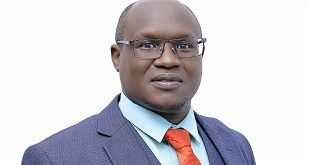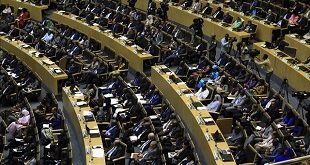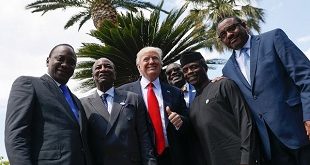
By Haggai Matsiko
Fight erupts over million dollar training deal in Uganda
A secret operation by security contractors based in Uganda has been underway training fighters, comprising Ugandans and South Sudanese, to fight in the South Sudan war, The Independent has learnt. The training is reportedly part of a deal worth millions of dollars between representatives of the Juba establishment and some of the security contractors based in Kampala.
The training has been taking place at a private airfield a few kilometres from Entebbe called Kajjansi Airfield. From here, and after the training, the fighters would be airlifted to South Sudan, sources familiar with it revealed.
Previously, the operation was kept under wraps but has been exposed following the failure by the contractors to meet their contractual obligations. Apparently, the representatives of the South Sudan establishment became furious after the contractors failed to deliver the agreed upon number of the mercenaries at the agreed time.

As part of the deal, military intelligence in Uganda has established that Juba had already paid the contractors a down payment of close to US$900,000 (approx. Shs3 billion).
By press time, a military source had confirmed that the Uganda People’s Defence Forces (UPDF) leadership, specifically the Chief of Defence Forces (CDF), Gen. Katumba Wamala, was aware of the arrangement.
While our sources said the UPDF top brass was hunting for the private security contractor who has since disappeared, Paddy Ankunda, the UPDF Spokesperson said he had no information about the arrangement. “Since it is a security issue,” Ankunda said, “You try police.”
When contacted, Police Spokesperson, Fred Enanga, said he was going to first contact Kajjansi and return with a response but he did not.
Critics say the operation is the latest window into how far the warring parties in South Sudan are willing to go in their struggle for power in a conflict that has claimed 10,000 lives, made over half a million flee the country and over 1.5 million get displaced internally.
Critics also say that such a plan means that efforts at reconciliation in which regional and international actors are heavily invested might not amount to anything.
Activity at Kajjansi
Kajjansi Airfield, located 20 kilometres north of Entebbe Airport, is divided into two—the Mission Aviation Fellowship (MAF) side and the Kampala Aeroclub and Flight Training Centre (KAFTC) side.
Both sections are heavily guarded by both police officers wearing the counterterrorism uniform and that of the Field Force Unit.
At KAFTC, which is accessed through Gate one, the officers manning the facility denied presence of any Sudanese and directed us to the second gate. At MAF, which is accessed at the second gate, however, officers admitted that there were trainees meant for South Sudan.
“They are not here,” an officer said, “The South Sudanese trainees were training at the other side of the first gate. That is where they train from.” Hinting at the possibility that recruitment was continuing, the officers said, anyone interested in training with the Sudanese has first to go to Entebbe where they register from.
According to the information on its website, KAFTC offers airplane and helicopter charters in Uganda and surrounding regions, as well as providing flight training and aerobatic/scenic flights.
Officials at both the South Sudan Embassy in Kampala and the UPDF have denied knowledge about this development.
“Where are they training from?” the South Sudan Ambassador Samuel Luate Lominsuk asked when The Independent contacted him. An official attached to his office, who he authorised to speak with The Independent, also denied any knowledge.
“We don’t have that information,” he said, “If any of our people were being trained here, we would be the first to know. Respective authorities in South Sudan would first notify us.”
He added that if anyone was training fighters for South Sudan, they are meant to fight as rebels.
Salva Kiir desperate
Those privy to the details of the deal, however, say it is part of a grand plan sold to Juba by security contractors to deal with the rebels.
They claim that training fighters to uproot the Riek Machar-led rebels that have upset the Juba government since 2013 started after it became apparent to the Juba establishment that the UPDF would not actively pursue the rebels.
When war broke out in December 2013, the UPDF deployed in South Sudan and was mainly responsible for rolling back the rebels who were only hours away from overthrowing the government.
When the UPDF deployed, it first overpowered the rebels that were keen on capturing the key government installations including the Juba Airport—South Sudan’s major airport, among others.
With a base at the Juba Airport, the UPDF was also involved in recapturing Jonglei State’s capital of Bor and pushing rebels farther north. But international pressure meant that the UPDF could not push further given that its leadership claimed that they would only go as far as securing the main facilities of President Salva Kiir’s government.
And as regional and international voices calling for dialogue increased, the UPDF even scaled down its operations in South Sudan.
Several attempts to resolve the crisis through talks witnessed by the United Nations, African Union (AU) and the Inter-Governmental Agency for Development (IGAD) have failed.
The last round of talks collapsed this March in the Ethiopian capital, Addis Ababa, and fighting resumed.
As early as May, the rebels announced they had taken control of the country’s main oil fields after defeating government forces in Upper Nile. With some oil fields under their control, the rebels are in position to wait out the Juba establishment, which now finds itself short on revenue given that oil production has been slashed.
Before the war, oil revenue accounted for 98 percent of the country’s budget. The war has meant that oil production has been cut by up to 60 percent.
The Juba establishment expected the UPDF to protect the oil fields. However, while still close to the country’s leadership, President Museveni, who was in the capital as South Sudan celebrated its independence anniversary on July 9, seems to have bought into the view that Uganda should only stop at taking care of its interests.
President Museveni has explained that one of these interests is that South Sudan is Uganda’s biggest regional market. He has also said that Uganda had to intervene to prevent a blood bath and a refugee crisis in the northern part of Uganda. The other issue is that a crisis in South Sudan can offer Joseph Kony and his Lord’s Resistance Army (LRA) an opportunity to re-emerge as a serious security threat.
From Uganda’s position therefore, the presence of UPDF in the country seems to serve these interests.
Power hungry leaders
Kiir, however, is keen to flush out the rebels because they are a constant reminder that his power is threatened. That is why even his speech on July 9, in which he called on South Sudanese to join hands with him to stop “this senseless war and work for peace, reconciliation and reconstruction of our country,” was seen as mere lip service.
He said he had worked tirelessly to end the fighting and the suffering of the people but many critics say he and Machar have sustained the fighting for selfish reasons—mainly hunger for power.
“Only leaders on both sides can end this violence,” the U.S. National Security Advisor Susan Rice said in a video message to mark the country’s independence. “Yet, President Kiir and Riek Machar would rather haggle over personal power and wealth than agree on solutions”.
The U.S. Ambassador to the UN, Samantha Power, also made the same point that day when she said that while the people of South Sudan want peace and stability, they have leaders who are more interested in their own personal fortunes than the welfare of their people.
The Intergovernmental Authority for Development (IGAD), which brings together six East Africa region countries including South Sudan, and has been the main arbiter, has called on Kiir and Machar to show leadership and demonstrate to the world that they can restore peace in South Sudan. Its officials remain hopeful that the much needed stability can return.
But Kiir does not seem very amused with that talk. He has said that while his government is committed to resolving the conflict under IGAD mediation, “the end result must be peace that is not imposed on them by others in order to divide us”.
Machar is also not relenting. Just days to the country’s independence celebrations, the rebel leader told reporters in the Kenyan capital that the civil war will continue as long as President Kiir remains in power.
“We don’t feel like we have a peace partner with Salva Kiir,” Machar said. Yet a day before, he had told Al Jazeera that he wanted a power sharing deal with Kiir.
South Sudan’s parliament voted in March to extend Kiir’s mandate by three years, essentially ruling out plans for elections previously planned to take place this year. But Machar says that his fighters do not recognise this and that Kiir’s government is now unconstitutional.
Since the last round of talks collapsed in March, IGAD has proposed bringing more mediators into the talks, including the United Nations, United States, China and the African Union.
But with talk of training fighters, it seems Kiir and Machar are still far from reconciliation.
 The Independent Uganda: You get the Truth we Pay the Price
The Independent Uganda: You get the Truth we Pay the Price


